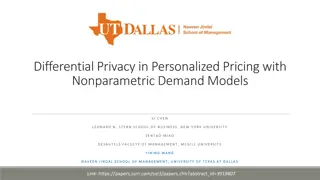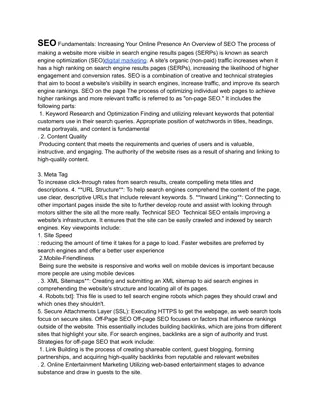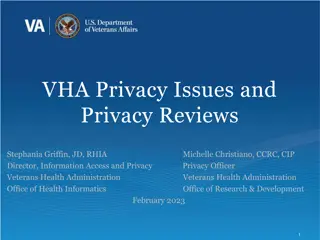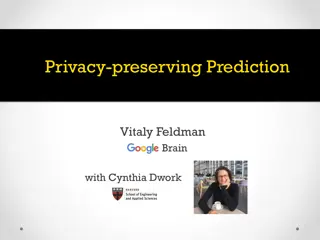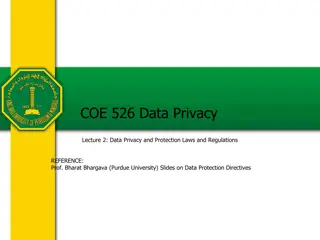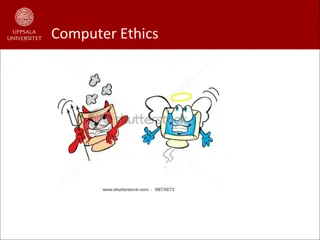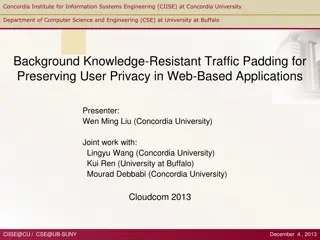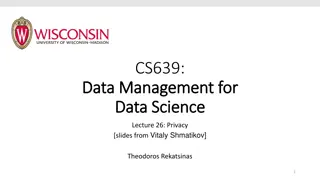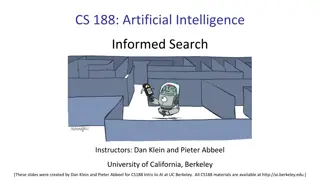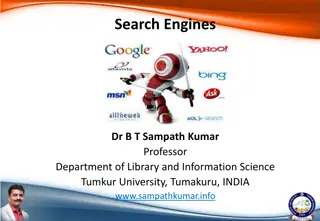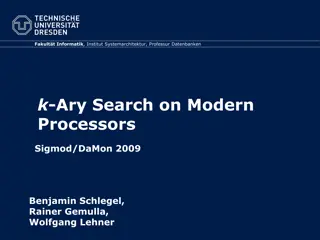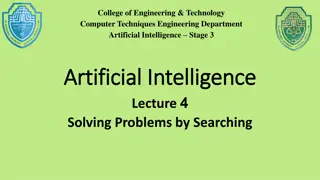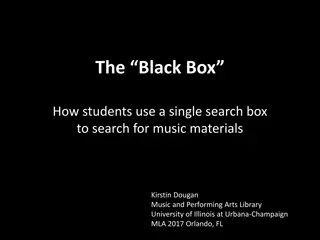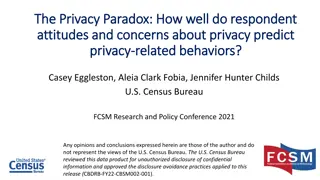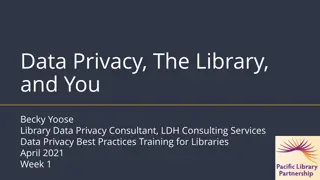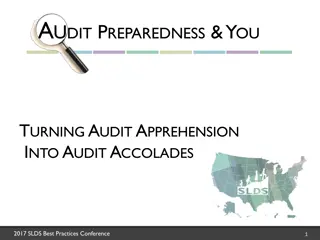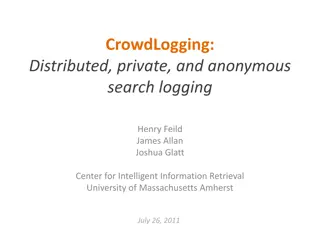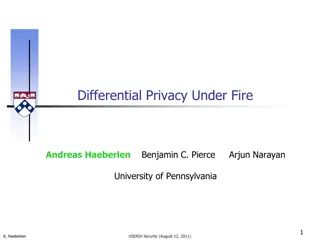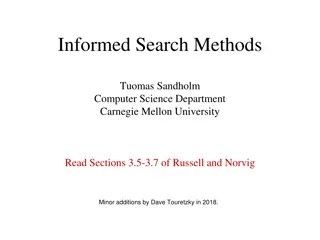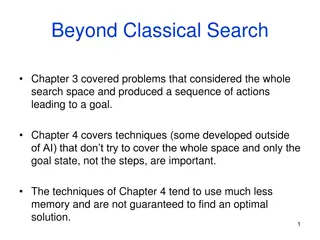Safeguarding Student Privacy in Educational Technology: A Comprehensive Guide
This brief overview covers essential topics such as student privacy, data protection, educational technology use, compliance with privacy regulations, and communication strategies. It delves into the risks associated with student data collection and sharing, emphasizes the importance of privacy prac
5 views • 42 slides
Dynamic Pricing Algorithms with Privacy Preservation in Personalized Decision Making
Explore the challenges of preserving privacy in dynamic personalized pricing algorithms for decision-making in business. The research focuses on nonparametric demand models and differential privacy to safeguard user data against various privacy attacks, addressing the growing concerns and the need f
3 views • 30 slides
Brief Introduction Of Search Engine Optimization
Search Engine Optimization (SEO) is the practice of enhancing the visibility and ranking of a website or web page in the organic (non-paid) search engine results. The higher a website ranks on a search engine results page (SERP), the more likely it is to attract visitors. SEO involves a combination
2 views • 16 slides
digital marketing
Search Engine Optimization (SEO) is the practice of enhancing a website to increase its visibility in search engine results pages (SERPs). A high ranking on SERPs is crucial as it attracts more organic (non-paid) traffic to a site, thereby increasing the potential for higher engagement and conversio
0 views • 2 slides
Exploring Privacy Features with Hyperledger Besu in Ethereum Development
Dive into the world of blockchain development with Hyperledger Besu, an open-source Ethereum client supporting various consensus mechanisms. Discover how Besu enables rapid development of privacy features, including flexible privacy groups, utilizing tools like Web3Signer and Besu-Kubernetes. Enhanc
0 views • 7 slides
Understanding VA Privacy Issues and Sensitive Information
Explore the complex landscape of VA privacy issues, including data relationships, sensitive personal information (SPI), personally identifiable information (PII), individually identifiable information (III), and individually identifiable health information (IIHI). Learn about the roles and responsib
0 views • 29 slides
Understanding Privacy in Information Security Training
Privacy awareness training is crucial, covering topics such as the definition of privacy, importance of privacy protection, Personally Identifiable Information (PII), and Sensitive PII. Discover why privacy is vital to maintaining public trust, preventing identity theft, and complying with laws. Lea
0 views • 55 slides
NCVHS Subcommittee on Privacy Comments on HIPAA Privacy Rule for Reproductive Health Care
NCVHS Subcommittee on Privacy, Confidentiality, and Security provided comments on the Notice of Proposed Rulemaking (NPRM) to modify the HIPAA Privacy Rule for reproductive health care privacy. The NPRM aims to address concerns post-Dobbs ruling, introducing new provisions for prohibited uses and di
0 views • 13 slides
Privacy-Preserving Analysis of Graph Structures
Explore the world of graph structures and differential privacy in data publishing networks, focusing on preserving privacy while releasing structural information about graphs. Differential privacy techniques such as edge privacy and subgraph counts are discussed in detail, highlighting the challenge
0 views • 20 slides
Understanding Search Procedures and Warrants in Legal Context
Search procedures play a crucial role in law enforcement, allowing authorities to explore, probe, and seek out hidden or suspected items. This comprehensive outline covers the meaning of search, locations where searches are conducted, objects searched for, legal definitions of search of a place, sea
0 views • 11 slides
Privacy-Preserving Prediction and Learning in Machine Learning Research
Explore the concepts of privacy-preserving prediction and learning in machine learning research, including differential privacy, trade-offs, prediction APIs, membership inference attacks, label aggregation, classification via aggregation, and prediction stability. The content delves into the challen
0 views • 11 slides
FMCSA Privacy Awareness Training Overview for 2022
Understanding the importance of privacy and Personally Identifiable Information (PII) in the context of the Federal Motor Carrier Safety Administration (FMCSA). The training covers topics such as the definition of privacy, why privacy is crucial, what constitutes PII, the significance of sensitive P
0 views • 55 slides
Understanding Data Privacy Laws and Regulations in Saudi Arabia
This content provides an overview of data privacy laws and regulations, focusing on the landscape of data protection laws, examples of comprehensive regulations like FIPPS and GDPR, and sector-specific laws in Saudi Arabia. It includes a homework assignment to explore Fair Information Practices Prin
0 views • 28 slides
Privacy and Registered Training Organisations: Lessons and Insights
Learn about privacy assessments conducted by the OAIC on Registered Training Organisations (RTOs) in collaboration with Navitas. Discover the legal frameworks, scope, and methodology of these assessments, along with tips for good privacy practices. Explore the findings, areas for improvement, and le
1 views • 30 slides
Powering the Digital Economy: Regulatory Approaches to Securing Consumer Privacy, Trust, and Security
This session at the ITU-BTRC Asia-Pacific Regulators Roundtable explored various aspects of online privacy, trust, and security in the digital ecosystem. It delved into the importance of data protection, privacy laws, and regulations to ensure online security and trust. Discussions also revolved aro
1 views • 7 slides
Exploring Computer Ethics and Privacy Principles
Computer ethics and privacy principles are essential in the evolving technology landscape. This content delves into different perspectives on computer ethics, views on privacy protection, and the implications of human enhancements. It highlights the importance of respecting proprietary rights, shari
0 views • 9 slides
Protecting User Privacy in Web-Based Applications through Traffic Padding
Explore a novel approach utilizing knowledge-resistant traffic padding to safeguard user privacy in web-based applications. The study addresses side-channel attacks on encrypted traffic, the challenges of maintaining security in untrusted internet environments, and the potential privacy overhead of
0 views • 31 slides
Understanding Breach of Confidence and Privacy Rights in English Law
English law does not provide a specific right to privacy, but breach of confidence laws offer protection against unauthorized disclosure of private information. While there is no overarching invasion of privacy tort, legal controls exist to balance freedom of expression with respect for individual p
0 views • 18 slides
Privacy Considerations in Data Management for Data Science Lecture
This lecture covers topics on privacy in data management for data science, focusing on differential privacy, examples of sanitization methods, strawman definition, blending into a crowd concept, and clustering-based definitions for data privacy. It discusses safe data sanitization, distribution reve
0 views • 23 slides
Covert Visual Search and Effective Oculomotor Range Constraints
The study delves into whether covert visual search is biologically limited by the Effective Oculomotor Range (EOMR), exploring neuropsychological evidence, eye movement studies, and participant measurements. It investigates the impact on visual search tasks, including color, orientation, and conjunc
1 views • 15 slides
Understanding Informed and Uninformed Search Algorithms in Artificial Intelligence
Delve into the world of search algorithms in Artificial Intelligence with a focus on informed methods like Greedy Search and A* Search, alongside uninformed approaches such as Uniform Cost Search. Explore concepts like search problems, search trees, heuristic functions, and fringe strategies to comp
0 views • 69 slides
Understanding Search Engines and Their Importance
Search engines, such as Google, play a crucial role in retrieving information from the web, providing access to a vast document collection, and helping users find what they need quickly and efficiently. They come in different types like robot-driven and meta search engines, each serving specific pur
1 views • 23 slides
k-Ary Search on Modern Processors
The presentation discusses the importance of searching operations in computer science, focusing on different types of searches such as point queries, nearest-neighbor key queries, and range queries. It explores search algorithms including linear search, hash-based search, tree-based search, and sort
0 views • 18 slides
Solving Problems by Searching in Artificial Intelligence: Uninformed Search Strategies
In the field of Artificial Intelligence, solving problems through searching is essential. Uninformed search strategies, also known as blind search, involve exploring the search space without any additional information beyond what is provided in the problem definition. Techniques such as Breadth-Firs
1 views • 26 slides
Challenges and Solutions in Web Search Engine Infrastructure
Search engines play a crucial role in accessing internet resources efficiently. However, users face challenges in formulating queries, understanding search engine logic, and dealing with data quality issues. The infrastructure behind search engines involves complex processes like web crawling and in
0 views • 36 slides
Understanding the Fourth Amendment: Search and Seizure Laws in the United States
The Fourth Amendment of the United States Constitution protects individuals from unreasonable searches and seizures by the government. It outlines the requirements for obtaining a search warrant, defines a reasonable expectation of privacy, and details the types of searches allowed without a warrant
0 views • 18 slides
Understanding Search Patterns for Music Materials in Libraries
Exploring how students search for music materials using a single search box, this study investigates if the nature of music materials influences search patterns compared to other subjects. It also evaluates the effectiveness of tools like federated search and discovery layers in facilitating searche
0 views • 25 slides
Heuristic Search Algorithms in Artificial Intelligence
In the realm of artificial intelligence, heuristic search algorithms play a pivotal role in efficiently navigating large search spaces to find optimal solutions. By leveraging heuristics, these algorithms can significantly reduce the exploration of the search space and guide agents towards the goal
0 views • 14 slides
Understanding the Privacy Paradox: Attitudes vs. Behaviors
Social scientists have identified a Privacy Paradox where individuals with strong privacy concerns may not always engage in behaviors that protect their privacy. While some studies show a discrepancy between attitudes and behaviors, others suggest that privacy-concerned individuals do employ privacy
0 views • 14 slides
Understanding Privacy Rights in Europe: A Comprehensive Overview
This content delves into the common definitions of privacy and the constitutional protection of privacy in Europe. It explores the right to privacy in individual, company, and government contexts, as well as ways to analyze the correlation between individual rights and others' duties. The discussion
0 views • 25 slides
Understanding Breach of Confidence and Privacy Rights in Legal Context
The legal landscape regarding breach of confidence and privacy rights, especially in the context of English law and the European Convention on Human Rights, is complex and ever-evolving. While English law traditionally does not recognize a right to privacy, recent developments and landmark cases hav
0 views • 18 slides
Understanding Depth-First Search in State Space Exploration
Depth-First Search (DFS) is a search strategy employed in state space exploration, where the search algorithm delves deep into a single branch of the search tree before backtracking to explore alternative paths. DFS is efficient for deep search spaces but can get lost in blind alleys if not implemen
0 views • 19 slides
Data Privacy Best Practices Training for Libraries
Explore a comprehensive data privacy training program for libraries led by Becky Yoose, a renowned Library Data Privacy Consultant. Supported by the U.S. Institute of Museum and Library Services, this training covers privacy fundamentals, current issues, risk assessment, vendor relations, patron pri
0 views • 33 slides
Enhancing Online Patron Privacy in Library Websites
This assessment by Marshall Breeding emphasizes the importance of maintaining online patron privacy on library websites. It covers key aspects such as the use of HTTPS, encryption, and privacy protection measures against vulnerabilities like tracking bots and unsecured transactions. The significance
0 views • 45 slides
Student Privacy Laws and Best Practices in Education Sector
Legislatures across various states are actively introducing and considering new student privacy laws, focusing on safeguarding online personal information and enhancing data transparency and security. Key themes include the introduction of privacy bills, the passing of data privacy laws, and the est
0 views • 30 slides
Privacy Awareness Week 2017: Understanding the Australian Privacy Act
Explore the key aspects of the Australian Privacy Act 1988 during Privacy Awareness Week 2017. Learn about the Australian Privacy Principles, regulatory powers of the Commissioner, and the importance of managing personal information transparently. Discover how the Act covers sensitive information, t
1 views • 31 slides
Distributed Search Logging: CrowdLogging vs. Centralized Model
CrowdLogging provides a distributed, private, and anonymous approach to search logging, contrasting with the centralized model that lacks user control and privacy. It offers advantages such as improved sharability and reproducible research results. The drawbacks of the centralized model include lack
0 views • 26 slides
The Challenges of Protecting Privacy with Differential Privacy
The article discusses the motivation behind using differential privacy to protect sensitive data while enabling useful queries. It highlights the promise of differential privacy, challenges faced, attacks on existing systems like PINQ and Airavat, and introduces a defense system called The Fuzz. The
0 views • 24 slides
Overview of Informed Search Methods in Computer Science
Detailed exploration of informed search methods in computer science, covering key concepts such as heuristics, uninformed vs. informed search strategies, Best-First Search, Greedy Search, Beam Search, and A* Search. Learn about different algorithms and their applications to solve complex problems ef
0 views • 47 slides
Techniques in Beyond Classical Search and Local Search Algorithms
The chapter discusses search problems that consider the entire search space and lead to a sequence of actions towards a goal. Chapter 4 explores techniques, including Hill Climbing, Simulated Annealing, and Genetic Search, focusing solely on the goal state rather than the entire space. These methods
0 views • 51 slides

